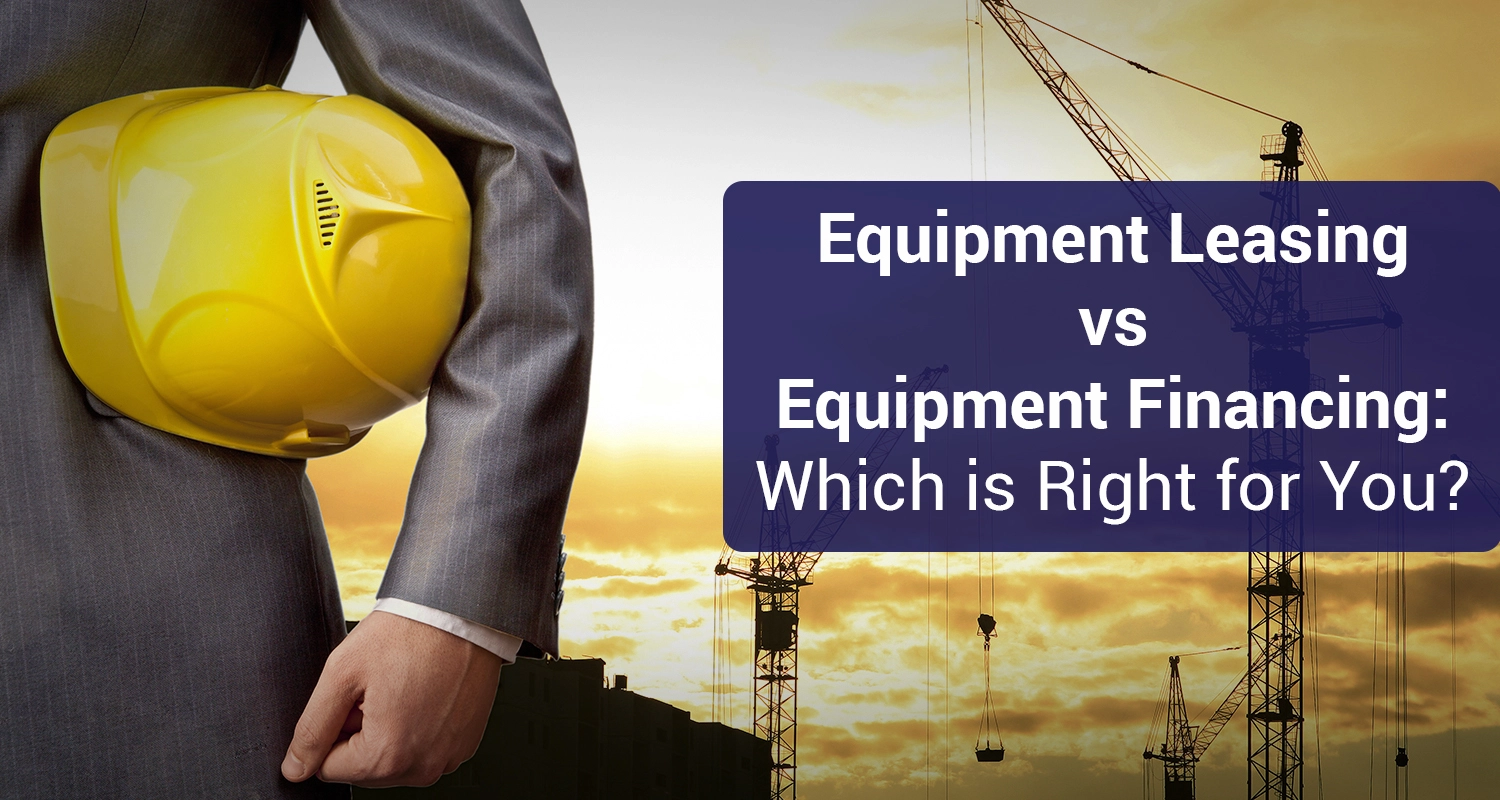Equipment Leasing vs Equipment Financing: Which is Right for You?

Manufacturing businesses rely on equipment to manage business operations' smooth running. However, as such equipment is depreciable, the business may need new equipment to continue the manufacturing operations or assist in business expansion.
In such cases where the need for equipment is immediate, should you choose to lease or finance the equipment? This blog will help you understand the difference between leasing and financing business equipment.
Equipment Leasing And Financing
When businesses need to buy equipment, they avoid using personal or business cash to retain positive cash flow to cover other immediate liabilities such as rent, employee salaries, etc. Hence, they look towards two of the most widely used ways: Equipment Leasing or Equipment Financing. The following factors affect the choice:
• Type of equipment needed for the business
• The usage cycle of the equipment
• Maintenance and repair cost of the equipment
• The resale value of the equipment
Once business owners have determined the above factors, they can choose between leasing or financing the equipment. However, before choosing between the two, it is vital to understand the difference between leasing and financing equipment for business.
Different Between Equipment Leasing And Equipment Financing
For a business owner, having the equipment on business premises for business operations is the most influential factor. Here is the difference between leasing and financing equipment for business:Leasing Business Equipment
It is a long-term legal agreement that allows the company to use the equipment for business during the tenure of the lease agreement. Under the equipment lease financing agreement, the business owner must pay a monthly fee to the lender, who purchases or owns the equipment. Such agreements create a contract between the actual owner of the equipment and the business owner to use the lender’s equipment for business against a monthly fee.
When the lease ends, the business owner has to return the equipment to the lender without any damage. However, business owners can renew the lease for a few years or purchase the equipment at the current market price from the lender. Unlike loan products, an equipment lease financing agreement does not levy any interest on the business owner, who only has to pay the monthly fee until the lease contract’s expiry. Every relatable cost for the lender is factored into the monthly fee charged.
Sapna aapka. Business Loan Humara.
Apply NowHere are some advantages of leasing business equipment:
1. As you do not own the equipment, you can replace the equipment with a new one after the lease is over.
2. Leasing business equipment does not negatively affect the company’s cash flow.
3. Business owners can avoid losses due to depreciation in the value of the equipment.
4. Business owners do not have to worry about reselling obsolete equipment after it is no longer usable.
5. Business owners can terminate the lease agreement at any time to reduce financial liabilities.
Financing Business Equipment
In this form of financing, the business owner borrows money from a lender such as NBFCs or banks to buy equipment for the business. Business equipment financing works similarly to taking a loan, where the borrower applies to borrow money from a lender to buy a piece of equipment for the business.
Such agreements create a contract between the lender and the borrower to repay the loan amount with interest within the equipment loan tenure. Generally, lenders offer close to the cost price of the equipment and create monthly EMIs for the borrowers to repay the loan over time.
Under business equipment financing, there is no need to pledge an external asset as collateral. The business equipment purchased by the business owner using the loan amount is automatically considered collateral. If the borrower defaults on the loan, the lenders have the right to seize the machinery and square off the losses made in the loan agreement by selling the equipment in the open market.
Equipment loans come with nominal interest rates. However, as the machinery prices vary, the interest rates on such loans entirely depend on the loan amount and the chosen tenure.
Here are some advantages of financing business equipment:
1. Business owners do not have to use personal or business capital to buy equipment.
2. The company has full ownership of the equipment and can use it in any way preferable.
3. The business owner can reclaim the interest charge by a margin by reselling the equipment.
4. The interest rates on equipment loans are nominal and offer flexible repayment options.
5. Unlike leasing, business owners do not have to find equipment owners willing to lease.
Avail Of Ideal Business Loans From IIFL Finance To Buy Business Equipment
IIFL Finance is India’s leading financial services company that provides comprehensive and customised loans for businesses to purchase equipment. The proprietary equipment loan offers instant funds up to Rs 30 lakh with a quick disbursal process. You can apply for the loan online via the website or offline by visiting IIFL Finance nearest branch.FAQs:
Q.1: Can I buy business equipment from IIFL Finance business loan amount?
Ans: Yes, you can use IIFL Finance business loan amount to purchase any piece of equipment for your business.
Q.2: What is the interest rate on IIFL Finance business loan?
Ans: Interest rates on IIFL Finance business loans start at 11.25% per annum.
Q.3: How much time does it take for IIFL Finance business loan to get disbursed?
Ans: The loan application is approved within 30 minutes of application and disbursed within 48 hours.
Ans. In India, Transunion CIBIL, CRIF, Equifax and Experian are the credit bureaus that are approved by RBI.
Q5. Which credit bureau is most accurate?Ans. While credit reports from all credit bureaus are valid and accurate, CIBIL Transunion is the most commonly accepted credit report by banks and lenders in India.
Q6. Which credit report do banks use?Ans. It depends from every bank’s individual choice. However a majority of the banks in India prefer to use Transunion CIBIL credit report.
Q7. Can I request my credit report from both Experian and CIBIL?Ans. Yes, absolutely. You can request your credit report from Experian and CIBIL. Analyzing reports from both bureaus will help ensure that your information is well-updated.
Q8. Is Experian credit score accurate?Ans. Yes, the Experian credit score is accurate and so is the credit score of CIBIL and Equifax. A lot also depends on the accurate information provided by you to these credit bureaus.
Sapna aapka. Business Loan Humara.
Apply NowDisclaimer: The information contained in this post is for general information purposes only. IIFL Finance Limited (including its associates and affiliates) ("the Company") assumes no liability or responsibility for any errors or omissions in the contents of this post and under no circumstances shall the Company be liable for any damage, loss, injury or disappointment etc. suffered by any reader. All information in this post is provided "as is", with no guarantee of completeness, accuracy, timeliness or of the results etc. obtained from the use of this information, and without warranty of any kind, express or implied, including, but not limited to warranties of performance, merchantability and fitness for a particular purpose. Given the changing nature of laws, rules and regulations, there may be delays, omissions or inaccuracies in the information contained in this post. The information on this post is provided with the understanding that the Company is not herein engaged in rendering legal, accounting, tax, or other professional advice and services. As such, it should not be used as a substitute for consultation with professional accounting, tax, legal or other competent advisers. This post may contain views and opinions which are those of the authors and do not necessarily reflect the official policy or position of any other agency or organization. This post may also contain links to external websites that are not provided or maintained by or in any way affiliated with the Company and the Company does not guarantee the accuracy, relevance, timeliness, or completeness of any information on these external websites. Any/ all (Gold/ Personal/ Business) loan product specifications and information that maybe stated in this post are subject to change from time to time, readers are advised to reach out to the Company for current specifications of the said (Gold/ Personal/ Business) loan.



